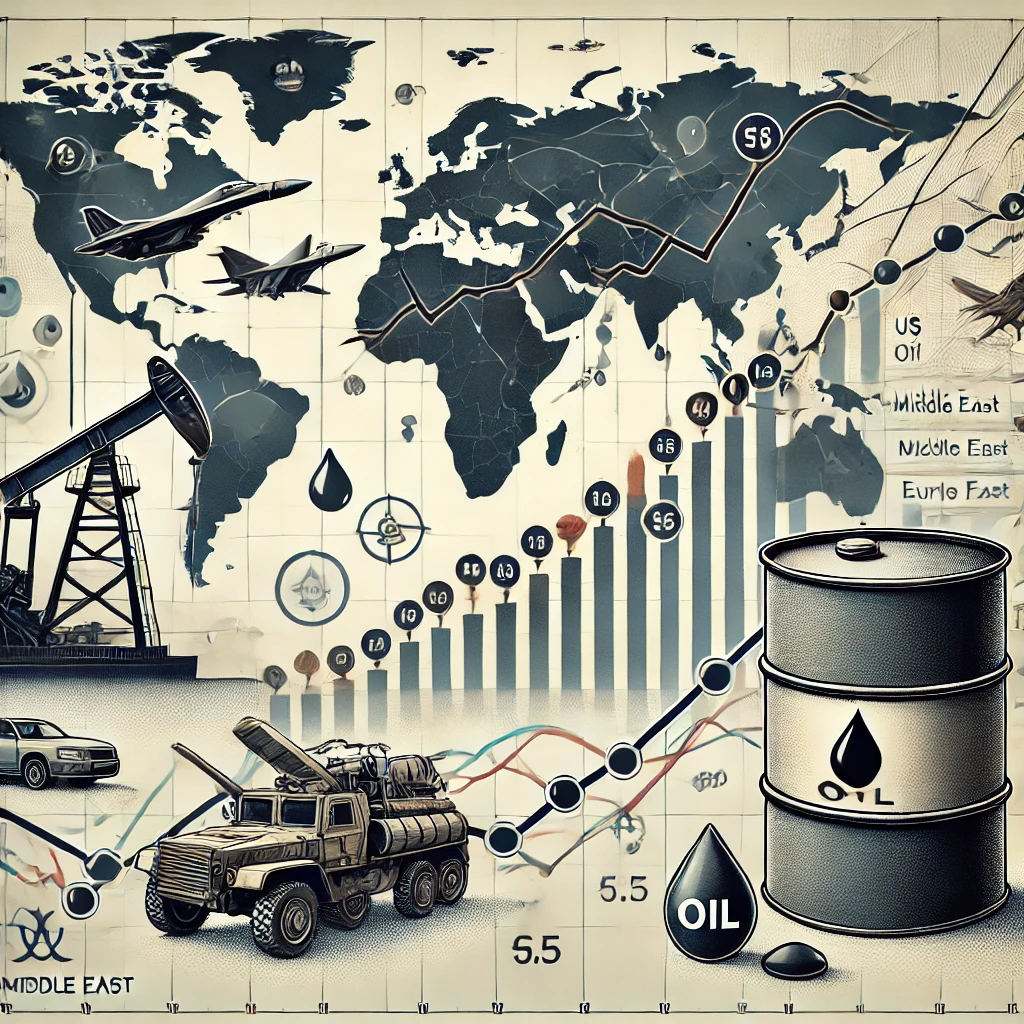The connection between crude oil and war has long been a subject of study, with implications for both global security and the economy. The involvement of various actors, including oil cartels and major political players, has led to a complex relationship where oil can act both as a trigger for conflict and a tool for economic leverage. Below is a detailed report on this subject, drawing on expert perspectives and insights into the interests of beneficiaries of the crude oil cartel, alongside their effect on the world economy.
1. Historical Context of Oil and Conflict
The relationship between crude oil and war dates back to the early 20th century, particularly during World War I, when the strategic importance of oil became evident. The industrialization of warfare, with the increased use of tanks, airplanes, and naval ships, highlighted the need for oil as a fuel source. As countries recognized oil’s importance for military power, securing access to oil fields became a priority for both economic and security reasons.
For example, during World War II, control over the oil fields in the Middle East and the Caucasus region became a key strategic objective for both the Axis and Allied powers. Oil was crucial for fueling the war machinery, and conflicts arose over control of oil-rich territories. This pattern continued into the Cold War, as superpowers competed for influence in oil-rich regions such as the Middle East and Central Asia.
Expert Insight: Scholars such as Daniel Yergin, in his seminal work The Prize: The Epic Quest for Oil, Money, and Power, emphasize how oil shaped global politics, becoming a critical factor in international conflicts and power struggles.
2. Oil Cartels and Their Role in Global Conflicts
The Organization of the Petroleum Exporting Countries (OPEC), formed in 1960, represents a consortium of oil-producing nations that work together to regulate oil production and prices. OPEC has often been seen as a “cartel” because of its influence over global oil prices through collective decision-making on output levels. Oil cartels, such as OPEC, have used their leverage over oil supplies to influence geopolitical outcomes. For instance, the 1973 Arab Oil Embargo, led by OPEC members in response to U.S. support for Israel during the Yom Kippur War, caused global oil prices to quadruple. This created an energy crisis in the West, contributing to a global recession.
Beneficiaries of Oil Cartels:
- Oil-exporting countries, particularly those in OPEC, benefit from higher oil prices, which boost their revenues. Countries like Saudi Arabia, Russia, and Venezuela have historically seen large portions of their government revenues come from oil exports.
- Multinational oil companies, such as ExxonMobil, BP, and Shell, also benefit from stability in oil prices and favorable extraction contracts in regions controlled by oil cartels. However, this concentration of power in the hands of a few oil-producing nations has also led to significant economic disruptions when oil prices are manipulated for political
purposes. As oil is a vital commodity for global transportation and industry, fluctuations in its price can have cascading effects on the global economy.
3. Impact of Oil on Modern Conflicts
Modern-day conflicts, particularly in the Middle East, are often deeply intertwined with control over oil reserves. The U.S. invasion of Iraq in 2003, for instance, while officially justified on the grounds of disarming weapons of mass destruction, was widely perceived by experts and analysts as partially motivated by the desire to control Iraq’s vast oil reserves, which are among the largest in the world.
Economic Implications:
- War in oil-producing regions, like the Iraq War or the conflict in Libya, often leads to disruptions in oil supply, causing prices to spike. This impacts oil-importing countries, leading to inflation, higher transportation costs, and increased production costs across various industries.
- Conversely, countries with strong oil reserves, like Russia and Saudi Arabia, can use their oil wealth to finance military engagements or strengthen their geopolitical positions. Russia, for instance, has been accused of leveraging its oil and gas exports to exert influence over European countries, particularly during moments of political tension.
Expert Opinions:
- Analysts such as Michael Klare in his book Blood and Oil argue that oil dependency continues to fuel international tensions and that many military interventions in oil-rich regions are, at least in part, motivated by the desire to secure energy resources.
- Former U.S. Federal Reserve Chairman Alan Greenspan stated in his memoir that “the Iraq war is largely about oil,” highlighting the economic motives behind military interventions in oil-rich regions.
4. Economic Effects of Oil Wars
Wars driven or influenced by oil interests have profound effects on the global economy.The most direct impact is on oil prices. When conflicts threaten the stability of oil production or transport, as seen in the Strait of Hormuz (a critical chokepoint for global oil transportation), oil prices tend to spike. This has a knock-on effect on economies around the world.
Global Economic Impact:
- Oil-importing countries, particularly in Europe and Asia, suffer from rising energy costs, which can lead to inflation and slow economic growth. For example, during the 1973 oil embargo, many Western economies experienced stagflation—a combination of stagnation and inflation.
- On the flip side, oil-exporting nations benefit from higher prices in the short term. However, prolonged conflicts can destabilize their economies, as seen in Venezuela, where political instability and mismanagement of oil revenues have led to economic collapse.
Energy Security: The strategic importance of oil has led many nations to prioritize energy security, often leading to military alliances or interventions aimed at ensuring access to oil supplies. Countries like the U.S. maintain military bases in the Middle East to protect critical oil infrastructure and shipping routes, such as those in Saudi Arabia and Kuwait.
5. The Role of Oil in Shaping the Global Economy
Oil is not just a driver of conflict; it is also a critical factor in shaping the global economy. The global economy is highly dependent on oil, particularly in sectors such as transportation, manufacturing, and energy production. Changes in oil prices have a direct impact on inflation, consumer prices, and economic growth.
Oil Price Volatility:
- High oil prices, often caused by geopolitical instability, can lead to inflation, reduced consumer spending, and slower economic growth. This was evident during the oil price spikes in the 1970s and early 2000s.
- Conversely, low oil prices can benefit oil-importing countries by reducing energy costs and boosting economic activity. However, they can also harm oil-exporting countries, leading to budget deficits and economic instability.
Transition to Renewable Energy: In recent years, the volatility of oil prices, combined with concerns about climate change, has led many countries to invest in renewable energy sources such as solar, wind, and electric vehicles. While this transition is still in its early stages, it has the potential to reduce the geopolitical importance of oil in the long term.
6. Conclusion
The connection between crude oil and war is deeply entrenched in both historical and modern contexts. Oil’s role as a strategic resource has led to conflicts, particularly in regions rich in petroleum reserves. The beneficiaries of the crude oil cartel, including oil producing nations and multinational corporations, often wield significant economic and political power. However, this concentration of power has also contributed to global economic instability, as fluctuations in oil prices caused by wars or political decisions can have far-reaching effects on the world economy.
The global reliance on oil has created a dynamic where energy security and geopolitical stability are inextricably linked. Moving forward, the transition to renewable energy may reduce the importance of oil in global politics, but until then, crude oil will continue to play a central role in shaping both conflict and the global economy.
References
Yergin, Daniel. The Prize: The Epic Quest for Oil, Money, and Power. Free Press, 1991.
Klare, Michael. Blood and Oil: The Dangers and Consequences of America’s Growing Dependency on Imported Petroleum. Henry Holt, 2004.
Greenspan, Alan. The Age of Turbulence: Adventures in a New World. Penguin Books, 2007.
British Petroleum (BP) Statistical Review of World Energy, 2022.
Organization of the Petroleum Exporting Countries (OPEC) Annual Report, 2022.
Contact us for your wealth management and more information.
Email: pramod.gamare@hotmail.com
Phone: 7559411986
Post Disclaimer
Disclaimer
1. The Alpha Wealth is a wealth advisory offering financial services viz and third-party wealth management products. The details mentioned in the respective product/ service document shall prevail in case of any inconsistency with respect to the information referring to BFL products and services on this page.
2. All other information, such as, the images, facts, statistics etc. (“information”) that are in addition to the details mentioned in the The Alpha Wealth product/ service document and which are being displayed on this page only depicts the summary of the information sourced from the public domain. The said information is neither owned by The Alpha Wealth nor it is to the exclusive knowledge of The Alpha Wealth. There may be inadvertent inaccuracies or typographical errors or delays in updating the said information. Hence, users are advised to independently exercise diligence by verifying complete information, including by consulting experts, if any. Users shall be the sole owner of the decision taken, if any, about suitability of the same.
Standard Disclaimer
Investments in the securities market are subject to market risk, read all related documents carefully before investing.
Research Disclaimer
Sub-Broking services offered by Sharekhan LTD | REG OFFICE: Badlapur, Thane 421503. Corp. Office: ---, Maharashtra 421503. SEBI Registration No.: --| BSE Cash/F&O/CDS (Member ID:--) | NSE Cash/F&O/CDS (Member ID: --) | DP registration No: --- | CDSL DP No.: --| NSDL DP No. --| AMFI Registration No.: ARN –253455.
Website: https://thegreenbackboogie.com//
Research Services are offered by The Alpha Wealth as Research Analyst under awaiting SEBI Registration No.: ---.
Details of Compliance Officer: -- | Email: --/ --- | Contact No.: -- |
This content is for educational purpose only.
Investment in the securities involves risks, investor should consult his own advisors/consultant to determine the merits and risks of investment.

